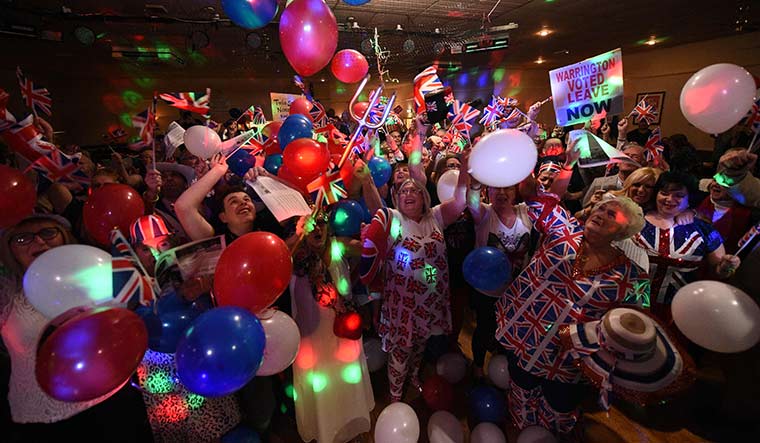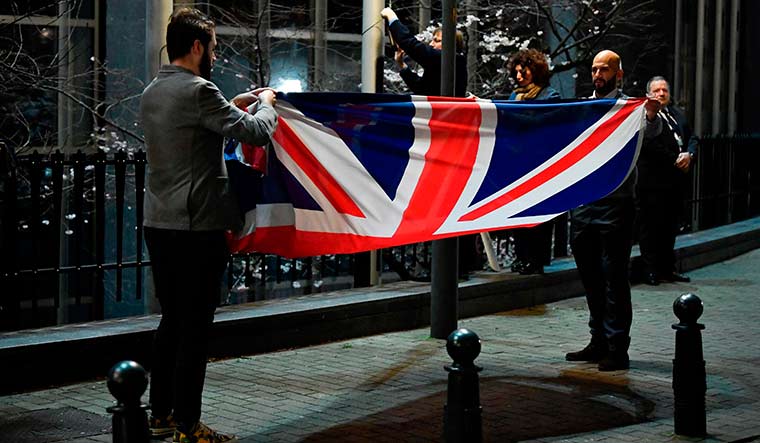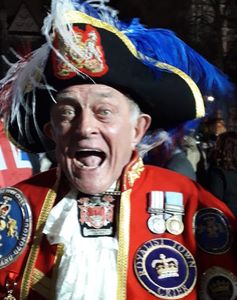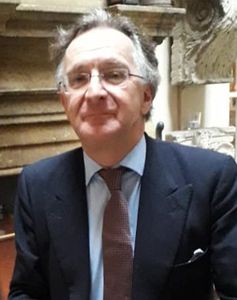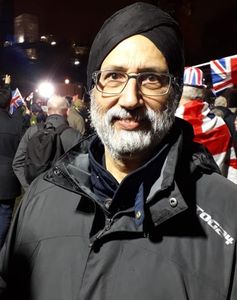It was the moment when everything and nothing changed.
Britain left the European Union to become an independent trading nation. But nothing changed because the current transition period lasts until December 31. That is when Brexit really happens, when Britain walks out of the idea of a united Europe, after having shared the dream for nearly half a century. Rejoiced Prime Minister Boris Johnson, “This is a fantastic moment in the life of our country. There are very few moments in our lives which really can be called a historic turning point—and this is it.”
It is a turning point, but some wonder whether the turn is forwards or backwards. No doubts smouldered in Parliament Square, where I mingled with ecstatic Brexiters on January 31, celebrating without fireworks or booze, but with flags and placards, chanting: “Rule Britannia, Britannia rules the waves; Britons never, never, never shall be slaves.” This was the venue of the sole public festivities. Dressed up in Union Jack regalia, town crier Tony Appleton exulted, “The war is over. We have won. We are free. We are our own boss.” This was Britain’s war to “take back control” from the EU. “We did it. We did it. Boris did it,” revellers chanted.
“No one ever put up a statue of a journalist,” Johnson famously said, explaining his passage from journalism into politics. In making history by delivering Brexit after a resounding election victory, Johnson could earn a statue, close to his hero Winston Churchill’s in Parliament Square. Johnson uncorked a £350 bottle of French red wine given by a donor and then celebrated with his cohorts with English sparkling wine in 10 Downing Street.
In London, Brexiters celebrated in mansions and clubs with menus headlined ‘New Dawn’. But it was a dark night for half the nation that wanted to remain in the EU. Some held candlelight vigils, others mourned in small groups in England, Wales, Northern Ireland and Scotland. With them in mind, Brexit celebrations were subdued because Johnson wished to avoid “triumphalism”, an aide explained.
Reactions were also subdued in Europe with few commemorative events. European Commission president Ursula von der Leyen said, “It is an emotional day. I will miss their pragmatism. It helped a lot. I will certainly miss their wonderful British sense of humour.” Brexit is a warning that EU leaders take seriously. French President Emmanuel Macron said, “Brexit is a historic warning sign that Europe needs to reform, become more democratic, simpler and closer to the people and to remember where lies can lead our democracies to.”
Europeans are frustrated that the EU has bloated into a superstate, with unelected bureaucrats in Brussels regulating the curve of bananas and the length of cucumbers. EU officials fear that a successful Britain could encourage other nations to leave. Leading Brexiter Nigel Farage predicted confidently, “There is no turning back because there will be no EU to go back to.”
Witty, iconoclastic and strong, Britain’s voice will be missed in the bloc. Especially by the small northern European countries that fired from behind Britain’s shoulder to trigger momentum for liberalisation, single market integration and fiscal discipline. Britain often needled France and Germany, but they relied on its military, intelligence, trading and diplomatic skills, which provided heft to the EU when tackling American unilateralism or Chinese ascent.
With Britain’s exit, France and Germany emerge stronger in the EU, “worrying the southern, east European and non-eurozone countries that already resent their dominance” said German economist Henrik Enderlein. The EU now wants to focus on its big projects—green deal, reforms, integration and hi-tech makeover. But Brexit continues to distract.
After one referendum, two elections, three prime ministers and nearly four years of wrangling, the Brexit process is far from over. Tough negotiations on the all-important trade deal begin next month and must finish by year end. Experts say 10 months are insufficient to conclude this complex deal—it took Canada seven years. Johnson projects toughness—no extensions, no convergence with EU regulations. Hard or soft Brexit, deal or no deal, Britain will leave or crash out of the EU on December 31, “come what may”. Sounds familiar, but Johnson has proved pessimists wrong before. But many see Johnson’s tough posture as a negotiating ploy.
The EU will watch out for devious manoeuvrings by the perfidious Albion, who has tried and failed many times to divide and rule and disrupt the EU’s decision-making. The UK wants access to the EU’s huge market, but to play by its own rules. The EU has dismissed such cherry-picking before. The EU’s main concern: Britain will subsidise industry, lower taxes, labour and environment standards to undercut the EU countries. Warned German finance minister Olaf Scholz: “There will be consequences. There cannot be an unfair competitive advantage from being outside.”
Location assists. Half of Britain’s £1.7 trillion trade is with the EU, the world’s largest trading bloc. If the UK and EU diverge, manufacturing supply chains snap. Issues like data flow—essential for British technology, health and insurance businesses—face crippling obstacles. Britain will be “13th in the queue“ for an agreement, said EU’s data protection supervisor Wojciech Wiewiorowski. Over 75 per cent of UK’s data processing and transfers are with EU countries. Warned economist Thomas Sampson, “Leaving the EU will, in the long run, reduce UK living standards.” If Britain crashes out without a deal, the spectres of traffic jams, shortages of food and medicine resurrect.
Such “scare-mongering” does not dampen the boundless enthusiasm of Brexiters. Unchained from the EU, they envision roaming free, far and wide, striking juicy deals all over the world, buying raw materials here, selling goods there. Britain has so far only struck ‘continuity’ deals with Liechtenstein, the Faroe Islands, Georgia, Lebanon and a few others. The bumper bonanza will be a deal with the US, which will be the EU’s envy. But this could be a devil’s bargain, breaking EU shackles only to be shackled to the US. Alternatively, instead of straddling a multi-polar world with one foot in Europe and playing footsie with the other in US, China and former colonies, Britain could fall between the stools.
Johnson could also fall between the domestic devil and the deep sea, between his traditional elitist conservative voters and the disgruntled workers who defected to him in the last election. He follows an illustrious predecessor, Benjamin Disraeli, who strove to unite Britain’s two nations—rich and poor. Johnson must also fulfil his promise to provide better infrastructure, educational facilities, health care, end austerity and reduce crime and immigration.
From cheers to jeers, Britain’s immigration story unravelled. Initially, the EU immigrants were welcomed because they brought affordable home repairs, filled pews in decaying churches and injected vitality to dying towns. But when Polish immigrants swelled to one million, memories of 70-hour waits for plumbers and electricians faded as resentful locals could not find jobs or houses in their hometowns.
Neighbourhoods changed. Clusters of Arabs and east Europeans thronged marketplaces, smoking and speaking strange tongues. Many locals found this threatening. In East England’s Lincolnshire, employers recruited cheap labour directly from Romania, bypassing the local employment exchanges. These locals, the left behinds, voted for Brexit. Now Johnson must find jobs and fend off immigrants to please them. But the industries rely on cheap imported labour and skilled workers to plump profits.
At risk is also United Kingdom’s dissolution. Scotland prefers to be with the EU than the UK and will campaign for independence in the next Scottish elections in 2021. Invoking images of Mary, Queen of Scots, Nicola Sturgeon, Scotland’s first minister, warned that they would not be a “prisoner” of England. Northern Ireland could decouple from Britain and unite with Ireland. These separatist causes have huge political and economic costs, but Brexit shows nothing can be ruled out.
Johnson’s challenge now is to convert the ‘Get Brexit Done’ campaign slogan into a ‘Get things done’ governing strategy. With the opposition Labour utterly demoralised, Johnson is strong. But he must dodge the clouds and grab the silver linings. Losses can be severe, but Britain also has world class finance, legal, pharmaceutical, tourism, real estate, creative and education industries. There are 57 world leaders educated in British universities, second only to the 58 from United States. While Johnson’s “Global Britain” slogan is mocked as imperial nostalgia, the UK has deep economic, political, cultural and security ties across the world. It remains one of the five permanent members of the UN Security Council. Noted British academic Tony Travers, “Disruptive change can be beneficial for a country.”
Brexit was a disruptive idea. As English writer H.G. Wells said, “Human history in essence is the history of ideas.” Brexit was not Johnson’s idea. He was conflicted before he converted. But now he has delivered. Historians will ponder: did Johnson make history or did history make him? A statue may or may not come up in the future, but Johnson will surely agree with German statesman Otto von Bismarck, who said: “The main thing is to make history, not to write it.”
Roddy Sale, 60
investment banker/ elephant polo player
This is a big moment in history. Indians will relate to this feeling, recognising the right to assume control over your own country, for better or for worse. I am connected to the British Raj. My grandfather was the collector of Bombay. My father’s first cousin, Sir George Abell, was private secretary to two Viceroys, Wavell and Mountbatten. This claim that Brexit is an expression of imperial nostalgia is total rubbish. Our younger generation has scant knowledge of history, let alone imperial history.
I was too young to appreciate when we joined the EU. The beginning was positive, but the growth in EU regulation curtailed the independent spirit of the British. The EU should learn lessons from Brexit; it must reform, become less bureaucratic and more democratic. I celebrated at a Brexit party; there were many politicians, artists and media personalities.
Eleanor Stephenson, 23
artist who works for a leading auction house
I am disappointed, potentially terrified. We step into the abyss of the unknown. I am most concerned being in the cultural field. How will Brexit affect us? Will Boris set up freeports (tax free storage for imported artworks) that are huge incentives for collectors and art dealers? Now we have freeports in Luxembourg and Geneva. Will London lose its status as a premium art destination? Will Asia take over, especially Beijing that is gathering momentum? I feel angst. The good thing is nothing will change for at least a year. Brexit divides even the art world. Several (anti-Brexit) galleries did not take part in the art fair. My mother is Dutch, she is an art teacher and lived in Sussex. She left Britain because she felt personally attacked. It is a different feeling to foreigners. Britain is a leading force in multiculturalism. It is beyond shame to let it disintegrate. I spent Brexit night in a sauna.
Fiona Watson, 55
businesswoman
I am a bit sad, but resigned. I am British but I am also part of something larger. I have worked in Europe, I have worked in labs with 30 different nationalities. I am part of a household and nation that was accepting of different cultures. I live in a community of 800 people that is mostly pro-Brexit. We have many sheep and wheat farmers, mostly older people, and they feel EU rules constrained them. We have had no tensions between leavers and remainers. I believe passionately in democracy, the voice of the people. For the county to heal, trust in the political class must be restored. The youngsters just want to get on with it. I am relieved the uncertainty has ended and there is a path forward. Because of the uncertainty, my clients held their funds. Now they have begun releasing the money. For me, I hope not too much changes in the short and long term. On Brexit night, I went to sleep as usual.
Oliver Johnston-Watt, 25
works for his father’s bitcoin technology startup
It is exciting, but also anticlimactic. We wonder: now what? I am relieved. This long wrangle has finally ended. Brexit will open up new opportunities. Colonial nostalgia does not resonate with the average youth, they are not really aware because it is not a big part of the history taught in schools. We look to the future. Boris Johnson is talking about big changes, being competitive. We must do different things to be globally competitive. Germany’s strengths are eroding. When it comes to efficiency improvements or innovative manufacturing, the United States is far ahead of Germany. Brexit allows us to get closer to the United States. I celebrated Brexit night with my Russian friends. Russians are big investors in the UK, in real estate, hi-tech, restaurants, fashion, film and commodities. They are veterans in dealing with uncertainty. They are not nervous. In the end, we all will continue doing what we always do: doing the best we can.
Harbinder Jhita, 58
builder
This is a once in a lifetime moment. My wife and I travelled from Warwick, 100 miles away, to spend the night in a hotel in London to be in Parliament Square. I am happy because we can set our own path. We must control our laws. I am sure other countries in Europe will follow our example. Britain was losing its heritage, culture and business. I am in the construction business. We have to strictly follow EU rules that some of the other European countries were lax about. I do not believe Brexit was supported only by far right sections of society. Majority of the media is causing all the arguments.
I did experience racism when I was growing up. I found the best way to deal with racism was to educate people, to integrate and work in the local community. There is a lot of anger against recent immigrants from EU countries who come in and take social benefits without contributing, without paying taxes. My father immigrated 50 years ago, starting as a cleaner. He never took benefits. Stopping uncontrolled EU immigrants creates space for immigrants from south Asian and Commonwealth countries.
Grzegorz Pytel, 54
business consultant
Brexit will have no impact on my decisions. I am Polish and have dual citizenship. The last three-year uncertainty was the worst even though it was a good negotiating tool. The country will move forward and make a success of it. Brexit gives the country more flexibility but this has to be tested. The more aligned the UK is to EU in the future, the better it is for all. Britain’s traditions and practices are different from Europe’s. They have proportional representation, so members of parliament do not represent individual constituencies like here. Here, MPs often had to tell their constituents they could not do anything to solve their problems because the decision was made in the EU. People were angry with both their MPs and the EU. Voters experienced a democracy deficit. Grexit and the EU’s treatment of an insolvent Greece touched a raw British nerve. Why be part of a club that treats you so badly? Instead of doing everything according to EU treaties, Britain will now evolve in a natural way.
Peter Nicastro, 50
cab driver
I am pleased. I did not vote in the 2016 referendum because I did not have the knowledge. Then I sided with the winners. I am pleased because Brexit was getting on my bloody nerves. The first six months were good entertainment. It was good TV and radio. But then it would not stop. Every time I heard Brexit, I switched off the TV. We do not know what is going to happen. Even the bankers in London do not know. But I think it will be alright. We have been alone before. I know that was a long time ago, but there are other countries that are alone, too. The next few years will be difficult, but afterwards we will be better off. Other countries will want to leave and the whole EU thing will come apart. Now we can get on with our stuff—national health service, have more police on the street to stop knife crime. The youth in this country is out of control. I worry because I have three sons. Immigration is okay if controlled—now you see Roma people (gypsy migrants from Romania) camping in Mayfair! Brexit will all end up fine. The British people will make it work.



